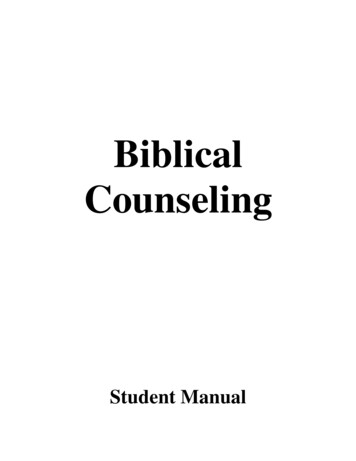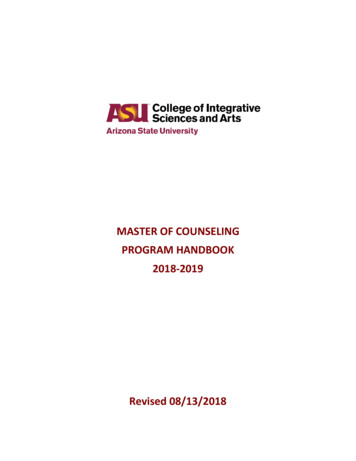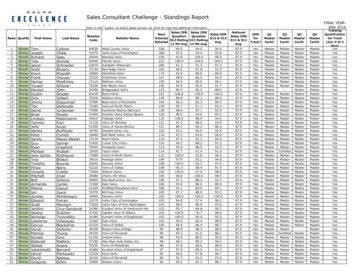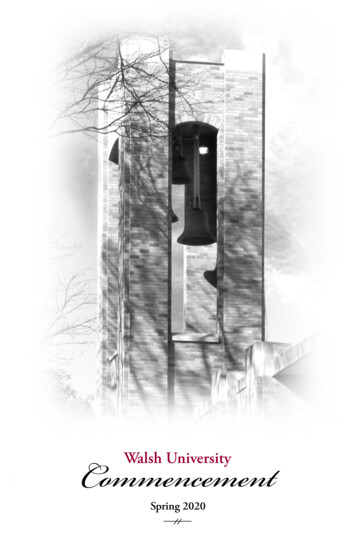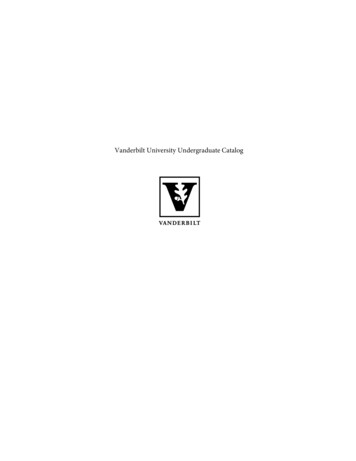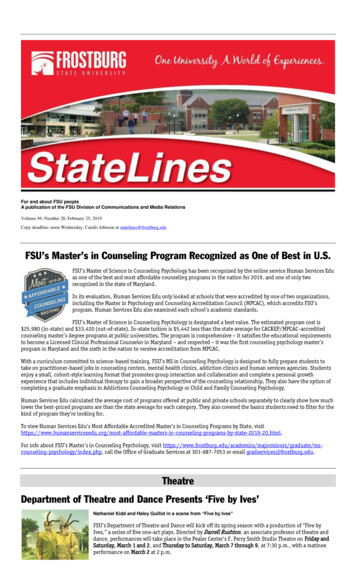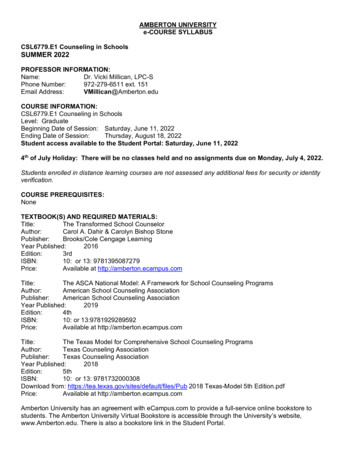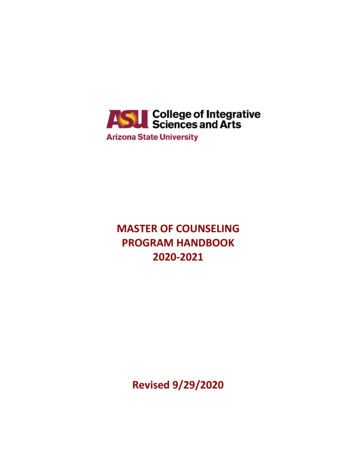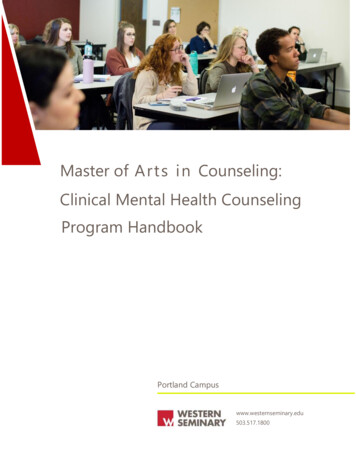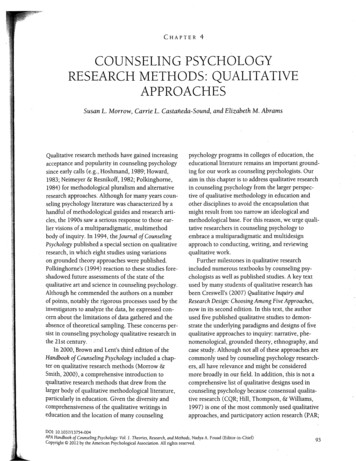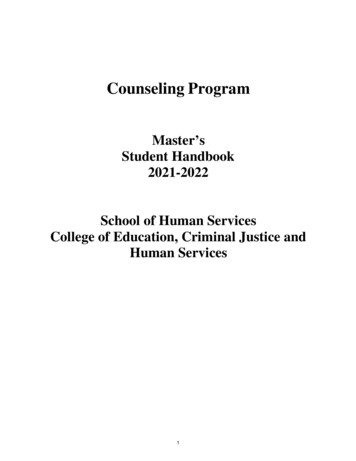
Transcription
Counseling ProgramMaster’sStudent Handbook2021-2022School of Human ServicesCollege of Education, Criminal Justice andHuman Services1
TABLE OF CONTENTSPREFACE . 3INTRODUCTION TO THE COUNSELING PROGRAM ATTHE UNIVERSITY OF CINCINNATI. 4FINAL TERM, GRADUATION, AND OTHER PROGRAMCONSIDERATIONS .38National Counselor Exam (NCE).38Program Objectives . 4Graduation Application for M.A. and M.Ed. .39Programs of Study in Counseling . 5Switching Between Programs (M.A., M.Ed.) .39Accreditation and Program Approval . 6Documenting Your Work.40Student Composition . 6UNIVERSITY RULES AND REQUIREMENTS.43The University and Community . 6Support Systems . 7Grading Practices .43Full-time/Part-time Enrollment .43Faculty . 9Procedures for Registration .43Program Advisory Committee . 11Audit Regulations .44Commitment to Diversity, Social Justice, andInclusion . 12Unapproved or Inappropriate Courses .44Program Communication . 12Professional Organizations . 12Graduate Credits and Grading Practices .44Active Standing and Leaves of Absence .45MASTER’S PROGRAMS OF STUDY . 14Time-to-Degree Requirements .46Program Overview. 14Student Records .46School Counseling . 14Grievance Procedures and Other ComplaintProcedures .46Withdrawals .44Mental Health Counseling . 17School and Mental Health CounselingComprehensive Exam . 19FINANCIAL ASSISTANCE .46Graduate Assistantships (GA) .47MASTERS’ THESIS OPTION . 21Graduate Incentive Awards .47Master’s Thesis Application Process . 21Graduate Assistantship Policies .48Master’s Thesis Process and Responsibilities . 21MODIFICATION OF HANDBOOK.51Conducting the Study . 22APPENDICES .52PROGRAM DESIGN AND APPROVAL . 24Working with the Program Advisor . 24APPENDIX A: Master's Degree Program Curricula.53APPENDIX B:Individual Student Program PlanTemplates .56Program Plan . 24Completing Coursework . 25PROGRAM REQUIREMENTS AND EXPECTATIONS. 26APPENDIX C: Master's Level Counseling StudentPerformance Review.58Continuous Progress Monitoring and SelectiveRetention. 26APPENDIX D: Professional Development PlanTemplate .60Academic Performance Requirements. 28APPENDIX E: Internship Application Packet .65FIELD PLACEMENT . 30APPENDIX F: Field Placement Forms .68General Policies . 30APPENDIX G: School Counseling ProgramPortfolio .79Internship Start Time . 31APPENDIX H: Mental Health Counseling Exam .85APPENDIX I: Thesis Option Documents .87Clinical Sequential Courses . 32Stage I: Preparing for Practicum and Internship . 33APPENDIX J: Understanding and Acknowledgmentof Handbook Policies .93Stage II: Completing Practicum & Internship . 35Security of Client and Student Data for FieldExperiences . 372
PREFACEThe Counseling Program Master’s Student Handbook is intended to provide students withspecific information about the University of Cincinnati; the College of Education, CriminalJustice, and Human Services (CECH); the School of Human Services; and the CounselingProgram. This Handbook is a tool for students as they progress through the Master’s DegreePrograms in Mental Health Counseling and School Counseling. Program policies exist withinthe framework of those of the College and the University (Graduate School). The Master’sStudent Handbook presents policies and procedures specific to the Master’s Degree Programs(M.A. in Mental Health Counseling, M.Ed. in School Counseling) and is in compliance with therules and policies of the Graduate School and the College of Education, Criminal Justice, andHuman Services. Students are responsible for being aware of Program, College, and Universityregulations and policies described in the University of Cincinnati Graduate Handbook (availableon-line at www.grad.uc.edu), and the Student Code of Conduct. Direct links to these policies areprovided on the Counseling Program website.Graduate programs at the University of Cincinnati are organized within the Graduate School.The Dean of the Graduate School is responsible for coordinating, implementing, andadministering all policies, rules, and regulations pertaining to graduate degree programs,including those of the School of Human Services. Graduate Faculty determines educationalpolicy of the Graduate School and regulates admission of students, advancement to candidacy,and awarding of graduate degrees. The Graduate Faculty have sole power in establishingrequirements, but individual departments and programs determine specific courses of study,instructional methods, and evaluation of comprehensive examinations.3
INTRODUCTION TO THE COUNSELING PROGRAM AT THEUNIVERSITY OF CINCINNATICounseling Mission StatementThe UC Counseling Program strives for national excellence in implementing an ecological counseling perspectivethrough research and service with diverse populations, emphasizing underserved groups. As this vision is realizedthrough faculty, staff, and student efforts, the program continues a tradition of national leadership.The Counseling Program has four primary programs including the M.A. in Mental HealthCounseling, M.Ed. in School Counseling, Ph.D. in Counselor Education and B.S. in SubstanceAbuse Counseling. Recognized as one of the longest running counseling programs in the nation,the Counseling Program has a long tradition of training quality practitioners to serve in school(K-12), community, and university settings.The Counseling Program embraces ecological principles in counseling and research. Its programsemphasize applied ecological, systems-based counseling in training and scholarship activitieswith an emphasis on prevention work. Master’s degree students are trained in the delivery ofculturally competent counseling services while doctoral students are trained in the research andleadership skills necessary to help shape the delivery of mental health care services, particularlyamong those who are traditionally underserved.Program objectives are based upon three primary sources: (a) criteria established by those bodiesaccrediting the program (e.g., the Council for Accreditation of Counseling and RelatedEducational Programs [CACREP], the Council for the Accreditation of Educator Preparation[CAEP]), (b) relevant regulatory agencies (e.g., the Ohio Counselor, Social Worker, Marriageand Family Therapist Board [CSWMFT; for Mental Health Counselors] as well as the OhioDepartment of Education [ODE; for School Counseling]) and (c) the overarching philosophyarticulated through interactions among faculty, present students, alumni, and personnel incooperating agencies and schools.Program ObjectivesThe graduate counseling programs are all accredited by the Council for Accreditation ofCounseling and Related Educational Programs (CACREP), and each fully endorse the standardsand objectives adopted by CACREP. Within the Counseling Program, it is expected that allstudents will demonstrate their knowledge and skill competence in eight common-core areas andtheir associated knowledge and skill competence areas (listed below) as established by CACREP(2016). This will be accomplished through course and classroom-related assignments andactivities, examinations, research papers, role plays, and supervised clinical practice with actualclients. The common-core areas of the Counseling Program's knowledge and skill base include:1. Professional Counseling Orientation and Ethical Practice2. Social and Cultural Diversity4
3. Human Growth and Development4. Career Development5. Counseling and Helping Relationships6. Group Counseling and Group Work7. Assessment and Testing8. Research and Program EvaluationBeyond these eight general program objectives, the Mental Health Counseling and SchoolCounseling Master’s programs each have specific program objectives for their curricularemphases.Programs of Study in CounselingThe Counseling Program offers both master’s and doctoral training in counseling. In addition,the program offers an undergraduate degree in Substance Abuse Counseling as well asundergraduate certificates in the areas of Substance Abuse Counseling, Substance AbusePrevention, and Violence Prevention. For more details about these programs, see the Collegeof Education, Criminal Justice, and Human Services website.Master’s Degree Study in Mental Health Counseling (M.A.)The master’s program in mental health counseling is designed for individuals interested inbecoming Licensed Professional Counselors in the State of Ohio. This 60-credit-hour semesterprogram meets the training requirements established by the state Counselor, Social Worker, andMarriage and Family Therapist Board for initial licensure as a Licensed Professional Counselor(LPC) and is aligned with the CACREP accreditation standards. The program consists of a setof core classes augmented by specialization classes deemed necessary for practice of clinicalmental health counseling in community settings. See Appendix A for more detailed informationon the program curricula. On completion of the program, the student will meet the trainingrequirements for licensure as a LPC in the State of Ohio and may sit immediately for thelicensure examination (i.e., the National Counselor Examination).Master’s Degree Study in School Counseling (M.Ed.)The master’s program in school counseling is designed for individuals interested in becominglicensed as a Professional School Counselor in the State of Ohio. This 60-credit-hour semesterprogram in School Counseling meets the training requirements established by the OhioDepartment of Education and is aligned with the both the CACREP accreditation standards andthe American School Counselors Association (ASCA) National Model. In addition, the SchoolCounseling Program as well as the College of Education, Criminal Justice, and Human Servicesalign with the Ohio School Operating Standards (OAC Chapter 3301-35), The Ohio Standardsfor Professional Development, and the Ohio Core Administrative Requirements. The program isRevised August 20215
organized around a set of core classes augmented by specialization classes deemed necessary forpractice of counseling in the schools. See Appendix A for more detailed information on theprogram curricula. On completion of the program, the student will meet the training requirementsfor licensure as a School Counselor in the State of Ohio. To be licensed as a School Counselor,the student must be approved by the Ohio Department of Education having completed the SchoolCounseling master's program, passed the Ohio Assessment for Educators (#040), and completedthe BCI/FBI background check.Accreditation and Program ApprovalEach of the Master’s degree granting programs (M.A. in Mental Health Counseling and M.Ed. inSchool Counseling) is accredited by the Council for Accreditation of Counseling and RelatedEducational Programs (CACREP). In addition to CACREP accreditation, the CounselingProgram is located within the College of Education, Criminal Justice, and Human Services whichis accredited by the Council for the Accreditation of Educator Preparation (CAEP). Finally, ourM.A. in Mental Health Counseling is approved as meeting the training requirements for licensureby the Ohio Counselor, Social Worker, and Marriage and Family Therapist Board.Student CompositionEach year, a cohort of approximately 40 students across school and mental health counseling isadmitted into the Program. A broad range of geographic areas and undergraduate institutions isrepresented. Many first-year students have recently completed their undergraduate training,although many have relevant work experience. A special effort is made to recruit a diversestudent body. The Counseling Program and the University are deeply committed to providingthe guidance and support necessary for the successful completion of every student's programof study.The University and CommunityThe University consists of 14 Colleges and Schools providing a wide range of graduate andprofessional programs. Over the years, the University has achieved an outstanding national andinternational reputation in many areas. The Carnegie Commission has designated it a Level 1University (R1: Highest research activity). The National Science Foundation ranks theUniversity's sponsored research as 54th in the nation among all universities, and U.S. News andWorld Report ranks the University as the 65th best public institution and 5th for co-ops andinternships. The Chronicle of Higher Education called UC a “research heavyweight.” UC hasbeen cited as one of the most beautiful campuses in the world on the basis of its renowned newarchitecture, greenspaces and fountains, and renovations maintaining the majesty of itstraditional buildings.Over 46,000 students (approximately 11,000 graduate and professional) attend the University ofCincinnati. The campus includes excellent facilities for a variety of recreational activitiesRevised August 20216
including a highly rated Campus Recreation Center for swimming, basketball, running, tennis,racquetball, weight training and other activities. There is wide access to in-person and virtualcomputer labs and wireless networks. The University and College has undergone extensiverenovation both in its physical structures and technological supports to modernize and enhancestudent learning. It also sponsors movies, concerts, theater, athletic, and musical events. TheCounseling Program holds various social gatherings for Program students.The University is situated within the city of Cincinnati, rated as being one of the most attractiveand livable cities in the United States. Greater Cincinnati captures the unique characteristics ofthree states (Ohio, Kentucky, and Indiana) within a single metropolitan area. Its hills and valleyssurround the Ohio River, providing a setting for one of America's most beautiful inland cities.Public parks remain a rich resources for the “Queen City,” with wide open spaces for students toenjoy. Within the region are many opportunities for outdoor recreation including camping, hiking,rock climbing, downhill skiing, and boating/canoeing. The city is noted for its cultural heritage,with its nationally known symphony orchestra, opera, ballet, museums, zoo, and public theater.Professional sports are popular here, especially the Cincinnati Reds baseball team, the CincinnatiBengals football team, and its newest professional team, FC Cincinnati (Major League Soccer).UC’s basketball team enjoys staunch community support as well. Cincinnatians love festivals; thelegendary fireworks display on Labor Day weekend, the Oktoberfest in the fall, and numerousholiday celebrations between Thanksgiving and New Year’s Day are special favorites. The cost ofliving is moderate, as is the climate. There are many moderately priced restaurants in the area, withoutdoor seating and delivery options, along with a year-round Farmer’s Market ten minutes fromUC. Cincinnati’s specialty ice cream (i.e., Graeter’s) is shipped to its devotees all over the country.The Cincinnati metropolitan area of 2.1 million people has 8 colleges and universities in additionto the University of Cincinnati. The city is located conveniently along major interstates as well asairline, train, and bus routes. It is within a 2-hour drive of Columbus, Indianapolis, Louisville, andLexington, and within five to six hours of Pittsburgh, Cleveland, St. Louis, Knoxville, Detroit,and Chicago.Support SystemsGraduate study is extremely challenging and demanding, both academically and personally. Thecounseling faculty expects each graduate student to demonstrate maturity, professionalism,initiative, and independence, and we also strive to support and assist students in their endeavorsas much as possible. An emphasis on close student-faculty relationships is maintained bycarefully limiting the number of students enrolled in the Program to be aligned with professionalstandards and through regular meetings between faculty advisor and advisees. Students also areactively encouraged to collaborate as a cohort and develop support networks for study.Various support systems exist within the University itself to assist students. Information aboutsupport services is included in the folder distributed at the Program Orientation. Among theseservices are the following:Revised August 20217
Division of Experienced-Based Learning and Career EducationAssists students in obtaining part-time employment; assistance is also available for the spousesof students (http://www.uc.edu/careereducation.html).Computer Facilities and E-MailStudents have wide access to computers, printers, and technical assistance in computer labs inTeachers College and throughout the campus, as well as wireless access. All students must sign upfor a UC email account which provides access to internet, e-mail, and various campus resources.This University-assigned e-mail is the official means for university and Programcommunications, so students are responsible for checking their e-mail regularly. E-mail fromthe program and faculty can only be sent to the student’s UC e-mail account.Counseling Services, Clifton CampusStudents have access to counseling and mental health care through the University Health Services(UHS), which can provide both psychotherapy and psychiatric services. In addition, Counseling andPsychological Services (CAPS) can provide professional counseling upon request; students mayreceive three free counseling sessions through CAPS without insurance. Students are encouraged toseek assistance for anxiety, depression, trauma/assault, adjustment to college life,interpersonal/relational difficulty, sexuality, family conflict, grief and loss, disordered eating andbody image, alcohol and substance abuse, anger management, identity development and issuesrelated to diversity, concerns associated with sexual orientation and spirituality concerns, as well asany other issue of concerns. After hours, students may call UHS at 513-556-2564 or CAPS Cares at513-556-0648. For urgent physician consultation after-hours students may call 513-584-7777.Accessibility ResourcesThe University provides supports and services for students with disabilities through theAccessibility Resources Office (513-556-6823). The University of Cincinnati is stronglycommitteed to maintaining an environment that guarantees students with disabilities full access toeducational programs, activities, and facilities. In addition to academic accommodations in theclassroom, students, faculty, or staff are encouraged to use the Adaptive Technology lab in 408Langsam, next to the STRC editing suites.Ethnic Programs and ServicesThe Office of Ethnic Programs and Services (EPS; 513-556-6008), within the Division of StudentAffairs, embraces the ever increasing diversity of the University of Cincinnati campus byproviding quality programs and services that: 1) enhance the cultural, ethnic, and racial awarenessof the entire university community; 2) support the needs, growth, and development of students ofcolor; 3) build bridges between the university and the community; and 4) address the academic,social, spiritual and cultural needs of the campus community.Financial AidSee Financial Aid section and Student Financial Aid for more information.Revised August 20218
Health ServicesUniversity Health Services (513-556-6655) provides various wellness and health services.HousingSpecial graduate student housing is available in the residence halls and in campus apartmentcomplexes; married student housing is also available. Current students can be very helpful insecuring off-campus housing.Parking ServicesStudents may sign up for a permit for various student parking lots through Parking Services (513556-2283). Space may be limited, but other options are available through private lots in the area.Technology ResourcesAssistance with various aspects of technology are available through UC Information Technology(UCIT) (Help Desk 513-556-HELP)FacultyThe Counseling Program is housed administratively in the School of Human Services, one offour Schools in the College of Education, Criminal Justice, and Human Services (CECH). Theother academic programs in the School are School Psychology, Behavior Analysis, HealthPromotion and Education, and Sport Administration.Eight full-time faculty members are responsible for the Counseling Program. Each facultymember is trained and experienced in counseling and counseling-related disciplines.Faculty members are actively involved in professional practice, consultation, training, andresearch in schools and community organizations. Additional, faculty members are very involvedin professional service at the local, state, regional, and national levels.Core FacultyJenna Marie Alvarez, Ph.D. (Assistant Professor-Educator) coordinates the School CounselingProgram and serves as the field coordinator for school counselor trainees. Dr. Alvarez received herdoctoral degree from Ohio University (CACREP Accredited) and completed her master’s inSchool Counseling from the University of Dayton (CACREP Accredited). She is currently alicensed professional school counselor with experience working at the elementary level.Additional school related experiences includes working as a special education teacher at themiddle school and high school. Her clinical experience also extends to community and hospitalsettings, where she served children and adolescents, as well as adults with addictions. Her researchinterests include disability culture, school counselor identity coupled with training, andassessment.Revised August 20219
Michael Brubaker, Ph.D. (Professor and Associate School Director) is the associate director ofthe School of Human Services and is a graduate of the University of Florida. Licensed to practicechemical dependency counseling in Ohio, he is also a Nationally Certified Counselor. Dr.Brubaker’s clinical and research interests have focused on underserved and socially marginalizedpopulations including the homeless, those who identify as lesbian, gay, bisexual, transgender(LGBT), and Appalachian.Amanda La Guardia, Ph.D. (Associate Professor and Coordinator) is primarily responsible fordirecting the counseling programs. A doctoral graduate of Old Dominion University, shecompleted a double cognate in Research Methodologies and Women’s Studies and a doubleconcentration in Marriage and Family Therapy as well as Community Agency Counseling (MentalHealth Counseling) in her Masters of Arts in Counseling. Her research interests include adolescentnon-suicidal self-injury and family crisis, professional identity development, collaborative care,and applications of feminist and Adlerian theory in clinical and educational settings.Zobaida Laota, Ph.D. (Assistant Professor-Educator) is primarly responsible for field placementin mental health counseling. Dr. Laota is a Licensed Clinical Mental Health Counselor Associateand a National Certified Counselor. She received her master’s degree in Clinical Mental HealthCounseling from NC State University and her PhD in Counseling and Counselor Education fromthe University of North Carolina at Greensboro. Dr. Laota has experience working with clients ina wide range of settings including hospice and palliative care, university counseling centers,counseling clinics, and nonprofit organizations.George Richardson, Ph.D. (Associate Professor) is a 2011 graduate of the Universty ofLouisville. He coordinates the Substance Abuse Counseling Program track and teaches substanceabuse counseling and counselor education courses. His research applies life history theory tosubstance abuse, examines the roles of religiousness and spirituality in substance abuse etiologyand recovery, and evaluates the effects of context-based learning approaches. He also has stronginterests in psychometrics and methods for addressing confounding variables in observationalresearch.Rachel Saunders, Ph.D. (Assistant Professor) is a 2020 doctoral graduate of the University ofNorth Carolina at Charlotte. She is a licensed school counselor and National Certified Counselorwith experience working at middle and high school levels. Dr. Saunders also has experienceworking with adolescents in a juvenile detention setting. Her research interests focus on the role ofschool counselors in K-12 education, specifically, the impact school counselors have on studentsin relation to multicultural acceptance, promoting a culturally-inclusive school environment,training counselors in cultural competence, and how school counselors can act as social justiceadvocates in academic, career, and social/emotional development.Mei Tang, Ph.D. (Professor) is primarily responsible for coordinating the doctoral CounselorEducation Program track, as well as teaching and advising in the master’s programs. She receivedher Ph. D. from the University of Wisconsin-Milwaukee in 1996 and currently teaches foundationcourses in both master’s and doctoral programs. Her research interests include career developmentRevised August 202110
of minority members, acculturation and cultural identity, counselor education pedagogy, andcrosscultural issues in counseling.Dr. Andrew Wood, Ph.D. (Assistant Professor) is primarily responsible for coordinating the fieldexperiences for the Mental Health Counseling track. He received his doctorate from the Universityof Central Florida (CACREP Accredited), having completed his master’s in Mental HealthCounseling from the University of North Florida. Dr. Wood teaches in the areas of abnormalbehavior and diagnosis as well as counseling theories. His scholarly interests pertain to chronicillness and quality of life as well as religious and spiritual issues in counseling.Associate FacultyAssociate Faculty status is a vehicle to coordinate efforts of faculty who are making contributionsto the education of mental health and school counselors, and especially to contribute to doctoraleducation in the area of research and scholarly productivity. We are developing a partnership withthe faculty listed below, drawn from the academic areas of Health Promotion and Education,Educational Foundations, A&S Psychology, and Social Work. These faculty potentially areavailable for dissertation committees, research grants, program development, and involvementwith our emerging Center for Ecological Counseling.The current Associate Faculty are:Keith A. King, Ph.D., Professor, Health Promotion and EducationLaTrice Montgomery, Ph.D. Assistant Professor, Psychiatry & Behavioral NeurosciencePaula Shear, Ph.D., Professor, Psychology and PsychiatryGiao Tran, Ph.D., Associate Professor, Women’s, Gender, & Sexuality StudiesLisa Vaughn, Ph.D., Professor, Pediatrics & Educational Studies (Joint Appointment)Rebecca Vidourek, Ph.D., Associate Professor, Health Promotion and EducationEmeritus Faculty MembersThe Counseling Program has four emeritus faculty members:Robert K. Conyne, Ph.D. [Retired June, 2006]Ellen P. Cook, Ph.D. [Retired June, 2013]F. Robert Wilson, Ph.D. [Retired December, 2011]Geoffrey G. Yager, Ph.D. [Retired August, 2016]Program Advisory CommitteeThe Community Advisory Board (CAB), includes Program faculty and communityrepresentatives (e.g., mental health counselors, school counselors, agency administrators,alumni). This group meets a minimum of twice per year and is an important vehicle forcommunity input, future planning, collaboration for local professional development, and ingeneral, receiving feedback and input on program planning and direction.Revised August 202111
Commitment to Diversity, Social J
Counseling, M.Ed. in School Counseling, Ph.D. in Counselor Education and B.S. in Substance Abuse Counseling. Recognized as one of the longest running counseling programs in the nation, the Counseling Program has a long tradition of training quality practitioners to serve in school (K-12), community, and university settings.
